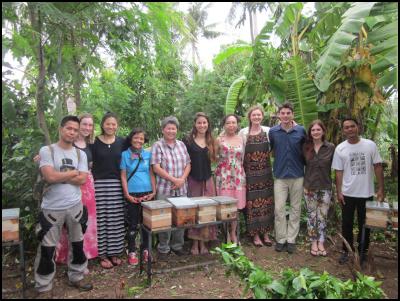Canterbury ‘Bee Team’ helps typhoon victims in Philippines
13 July 2015
Canterbury ‘Bee Team’ helps typhoon victims in the Philippines

Five University of Canterbury (UC) students have returned from the Philippines after helping a poor community of 2,280 people establish hives of stingless bees to aid the community’s recovery from typhoon devastation.
The Canterbury students helped cultivate 32 native bee hives for organic honey production in Barangay Tarong in Carles, Iloilo during a week-long visit to the community, which was hard-hit by typhoon Haiyan in November 2013.
Nicknamed ‘The Bee Team’, the students are Claire Musson, Kilali Gibson, Victoria Ning, Jessie Weber-Sparrow and Callum Clark. The team won UC’s 21 Day International Challenge in May.
The team established a beekeeping co-operative for honey and by-product production including pollen, propolis and cosmetic ingredients using the stingless native honeybee species Tetragonula biroi.
Team member Callum Clark says the hives are designed to provide a complementary, sustainable income for members of the Tarong community.
“We envision that the project will help those directly in the co-operative, as well as the wider community through indirect means such as education, environmental awareness and increased crop yield in other agricultural areas,” he says.
“It was a real privilege just to be part of this competition, but to see all the hard work implemented has been the most satisfying thing.”
The co-operative will be held in partnership with The University of the Philippines Los Baños (UPLB) Bee Programme. The project also set up an ornamental feature garden designed to promote recycling, sustainability and ecosystem awareness. The students also delivered an educational workshop for children at the local school, open for the whole village to attend.
The project budget and travel expenses of ‘The Bee Team’ were provided by UC’s College of Business and Law. The students were assisted on their trip by UC Associate Professor Sussie Morrish and Hannah Rhodes, Challenge Assistant.
“On this trip, we found the Filipinos very hospitable, accommodating and cheerful. Everyone we met – from the security details, tricycle drivers, farmers, professionals, government and local officials were very helpful and supportive of the team’s efforts. The most delightful, however, were the beautiful children who were absolutely excited about having visitors and learning about bees!” says Associate Professor Morrish.
The 21 Day Challenge gave six teams 21 days to develop a practical and unique solution to help improve the socio-economic well-being of the people of Barangay Tarong, which had been reliant on fishing until locals lost their fishing boats and livelihoods in the typhoon.
Each team comprised five students and five business mentors. The winning team was selected by a judging panel, which included Christchurch Mayor Lianne Dalziel.
Donations will enable two runner-up projects to be implemented to establish a collaborative community project to grow and dehydrate mangos and to set up an agricultural initiative that combines protective cropping and nutritional education.
ends


 Organ Donation NZ: Organ And Tissue Donation Helped Save And Improve The Lives Of Hundreds Of People In 2024
Organ Donation NZ: Organ And Tissue Donation Helped Save And Improve The Lives Of Hundreds Of People In 2024 Taupo District Council: Punarua Exhibition Arrives At Taupō Museum
Taupo District Council: Punarua Exhibition Arrives At Taupō Museum Office of Early Childhood Education: Teachers Are Paying The Price For Lack Of ECE Funding In The Budget
Office of Early Childhood Education: Teachers Are Paying The Price For Lack Of ECE Funding In The Budget Science Media Centre: Teen Dies After Controversial Tackle Game – Expert Reaction
Science Media Centre: Teen Dies After Controversial Tackle Game – Expert Reaction Howard Davis: The Amici Ensemble Provide A Master Class In Françaix, Fauré, & Brahms
Howard Davis: The Amici Ensemble Provide A Master Class In Françaix, Fauré, & Brahms Burnett Foundation Aotearoa: Local HIV Diagnoses In Decline, Challenges To Achieving Elimination Goal
Burnett Foundation Aotearoa: Local HIV Diagnoses In Decline, Challenges To Achieving Elimination Goal